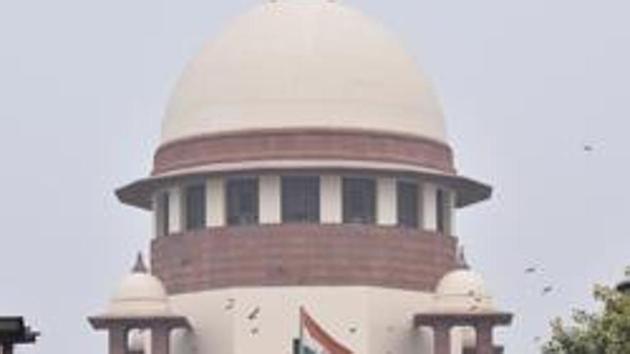Talks healthy, closer to resolution, SC told
CJI SA Bobde, however, also said that the top court has always encouraged talks, and that the legal adjudication surrounding the farm laws and farmers’ protests could wait if there was the possibility of a breakthrough.
The central government on Wednesday told the Supreme Court that an “understanding” could be in sight with the farmers’ unions over the contentious agricultural laws, even as the Chief Justice of India (CJI) lamented that there was “no improvement in the situation”.

CJI SA Bobde, however, also said that the top court has always encouraged talks, and that the legal adjudication surrounding the farm laws and farmers’ protests could wait if there was the possibility of a breakthrough. The court said it would take up the matter on January 11 but could defer the hearing in case there was some progress in talks.
The statement by the government suggesting a headway in negotiation has come two days after the seventh round of talks between the Centre and farm leaders ended in a stalemate. The three Union ministers part of the negotiations had suggested it was not possible to commit to a rollback of the laws without wider consultations with higher authorities. The farm unions had rejected this position, and said they would enhance their agitation -- a large tractor rally has been planned on the outskirts of the Capital on Thursday. Both sides, however, agreed to continue the talks on January 8.
On Wednesday, the CJI-led bench was hearing a plea by petitioner-advocate ML Sharma, who has challenged the laws on the ground that Centre lacked power to legislate on the issues directly relating to agriculture produce, its trade and market.
The bench, which also included justices AS Bopanna and V Ramasubramanian, told Sharma that his petition could also be heard along with another batch of petitions on the same issue that are listed on January 8. At this point, the CJI remarked: “There is no improvement in the situation at all.”
The comment triggered a response from solicitor general Tushar Mehta, who said that the government was into “healthy discussions” with the farmers, and this is why they did not want to file an affidavit in response to the petitions in the court.
“We will have to oppose the petitions if we file our counter affidavit. We are into a healthy discussion otherwise. So, we don’t want to file our affidavits and oppose the petitions. We don’t want to oppose anything formally since we are discussing right now,” Mehta submitted, indicating that a documented counter by the government at this stage may not be conducive for the talks.
Attorney general KK Venugopal, who also represents the Centre in these matters, added that the government would not want to put on record any kind of opposition regarding the farmers’ issues. “There are good chances that parties may come to an understanding. In case such an understanding is to be reached, we would not want to file our affidavits and oppose anything,” said Venugopal.
The law officers’ submissions prompted the CJI to observe: “We would like to encourage talks. That has always been our intention since we started hearing this matter.”
The bench then assured Venugopal and Mehta that the court could simply adjourn the proceedings on Monday to a future date if the talks continue. “We don’t want to create more problems when the talks are going on,” it added.
Asked about the government’s contention in the Supreme Court, Darshan Pal, a senior leader of the farmers’ agitation, said: “We are not a party to the any of the petitions regarding the three farm laws. Hence, we have no stand on this. The government must repeal the three laws, which continues to be our foremost demand.”
Pal, however, said the government has not shown any signs of rolling back the laws, and he insisted that there could be no progress without that.
Balbir Singh Rajewal, another farm union leader, said if there was any verdict by the court that has a bearing on the agitation, a response will be formulated only after studying the ruling. He said that the court had already made it clear that farmers had a right to protest peacefully.
Thousands of farmers are “fully prepared” for Thursday’s tractor rally that is planned to converge on the KMP Expressway, Rajewal said. The rally, which the farm unions are calling a “rehearsal” for a larger rally on Republic Day, will cover both eastern and western peripheral expressways.
“This will be a dress rehearsal for the tractor parade by farmers on Republic Day in the national capital,” said Yogendra Yadav, one of the leaders coordinating the protests.
Meanwhile, the court issued notices on Sharma’s petition, which has also challenged the 1954-amendment in the Constitution by virtue of which Entry 33 of the Concurrent List was re-enacted. This re-enactment also gave Centre the authority to legislate on trade and commerce in, and the production, supply and distribution of foodstuffs, cattle fodder, raw cotton and cotton seeds; and raw jute.
According to Sharma, the government misused Entry 33 to frame the three laws — Farmers Produce Trade and Commerce (Agriculture and Promotion) Act, Farmers (Empowerment and Protection) Agreement on Price Assurance and Farm Services Act and the Essential Commodities (Amendment) Act 2020. His petition contends the Centre has no authority under the Constitution to legislate on these issues, and only states can frame these laws. Sharma’s plea added the laws will lead to exploitation of farmers by big corporate houses.
On December 17, hearing a clutch of petitions relating to the farmers’ protests, the top court allowed the agitations to go on, and showed its inclination of setting up an independent committee to mediate between the protesting farmers and the government. The decision on the constitution of the committee, however, was deferred since the prominent unions spearheading the protests did not participate in the court proceedings.






